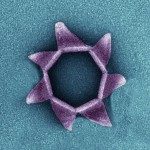Lien vers Pubmed [PMID] – 16164990
Biochimie 2005 Sep-Oct;87(9-10):793-803
Most evolutionists agree to consider that our present RNA/DNA/protein world has originated from a simpler world in which RNA played both the role of catalyst and genetic material. Recent findings from structural studies and comparative genomics now allow to get a clearer picture of this transition. These data suggest that evolution occurred in several steps, first from an RNA to an RNA/protein world (defining two ages of the RNA world) and finally to the present world based on DNA. The DNA world itself probably originated in two steps, first the U-DNA world, following the invention of ribonucleotide reductase, and later on the T-DNA world, with the independent invention of at least two thymidylate synthases. Recently, several authors have suggested that evolution from the RNA world up to the Last Universal Cellular Ancestor (LUCA) could have occurred before the invention of cells. On the contrary, I argue here that evolution of the RNA world taken place in a framework of competing cells and viruses (preys, predators and symbionts). I focus on the RNA-to-DNA transition and expand my previous hypothesis that viruses played a critical role in the emergence of DNA. The hypothesis that DNA and associated mechanisms (replication, repair, recombination) first evolved and diversified in a world of DNA viruses infecting RNA cells readily explains the existence of viral-encoded DNA transaction proteins without cellular homologues. It also potentially explains puzzling observations from comparative genomic, such as the existence of two non-homologous DNA replication machineries in the cellular world. I suggest here a specific scenario for the transfer of DNA from viruses to cells and briefly explore the intriguing possibility that several independent transfers of this kind produced the two cell types (prokaryote/eukaryote) and the three cellular domains presently known (Archaea, Bacteria and Eukarya).

